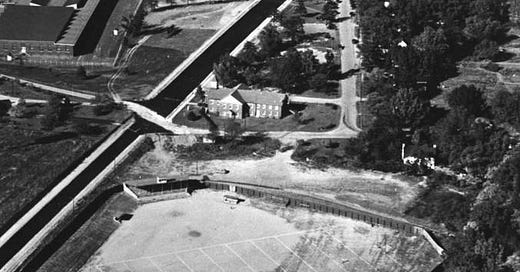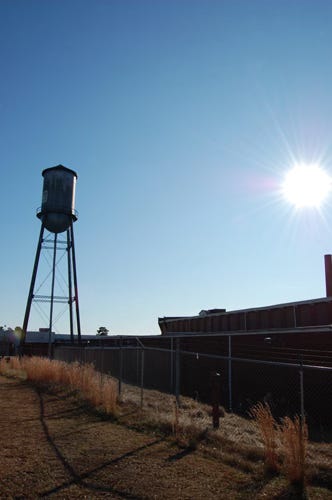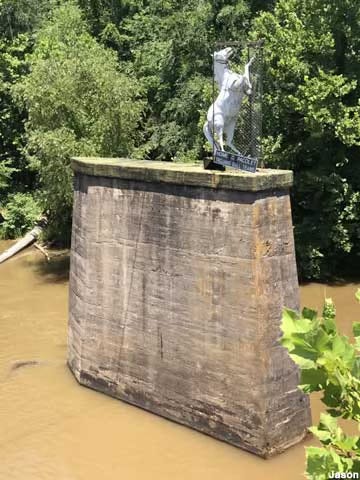The Risk of Reflection
A small town plant closed nearly 30 years ago, but the stories are still being told
Chesnee, South Carolina is as small as a small town in the USA gets. 829 people live within the city limits according to the most recent census, a number slightly less than 10 years prior. There isn't much of note in Chesnee: a good burger joint, a grocery store, and railroad tracks that pause traffic on the main drag at least two times a day. If you cross those tracks coming the back way into town (admittedly there are numerous backways into Chesnee), you'll see the famed burger joint on the left. The Bantam Chef is a '50s-style diner where the burgers, chicken strips, and milkshakes are all legendary. That's why it's one of the few restaurants to have stayed in business over the decades. If you're not turning into the Bantam Chef parking lot and you come to the light, turn right onto Alabama Avenue. It's away from downtown, but towards big school buildings full of teenagers on one side, and big empty buildings on the other.
It's an eyesore now. The water tower has rusted, the word Reeves barely visible. What started as weeds in concrete cracks are now full-blown shrubs. It's a fenced-in graveyard. Like I said, it's not much to look at. But the Reeves Brothers plant is too large to ignore. Though I guess if you're a local, you've learned to drive past without a second glance.
August 1997. I was nearing my junior year of high school, sweating away days in a steel plant punching holes in 20-foot beams and dragging painted shelves to dry in the brutal Carolina sun. That's when 400 Reeves Brothers' employees were told they were out of work. The fabric plant was shutting its doors in a month. Rumors floated about town months before, but who can ever know for certain what's gospel and what's not? You just show up, punch your time card, and get to work. The rest will settle itself.
Such was the life of the American mill worker. The idea in 21st-century America is if you lose a job, you simply move on to the next thing. Apply somewhere else. Get something else. Mills were different. Entire towns were built to surround mills. Entire blocks and neighborhoods consisted of mill workers. The horn sounds, and work begins. Late afternoon or evening, the horn sounds again, and everyone returns home. There wasn't a feeling of autonomy or ambition. There was simply doing your job to get money. Not to spend on extravagant vacations. Money to keep your family clothed and fed.
Textile mills defined the economy of the South in the mid-late 1800's through much of the 20th century. Cotton was king, and people wanted it for clothing and linens. A variety of factors left many mills shuddered and abandoned: economic depressions, cheaper competitors, and natural disasters all threatened the mills. In the 1930's, the cotton boll weevil decimated crops and, in turn, shut down mills and left thousands without income.
Though not a mill town in a traditional sense, Chesnee sits in a county full of them. Spartanburg County is home to Glendale, Inman, and Arcadia. Google Pacolet Mills and you'll find a statue of a white horse, its front legs kicking the air, poised as the defender of the mill. The statue sits atop a concrete tower in a river, its stone face determined, yet its surroundings bare. There's nothing left to defend.
A collection of poetry from author Ron Rash is dedicated in large part to his own family's heritage in the mills. His poem "Eureka" captures the compressed life of his grandfather, doing whatever he needed to do to make ends meet.
Here was no place for illumination
the cotton dust thick window-strained light.
The metal squall drowned what could not be shouted
everything geared warping and filling.
Though surely there were some times that he paused
my grandfather thinking This is my life
and catching himself before he was caught
lost wages or fingers the risk of reflection.
Or another recalled in those reckoning moments
remembering the mountains the hardscrabble farm
where a workday as long bought no guarantee
of money come fall full bellies in winter.
To earn extra pay each spring he would climb
the mill's water tower repaint the one word.
That vowel heavy word defined the horizon
a word my grandfather could not even read.
The stories of American families consigned to the mills have been told by many a historian. And in this talk of horse statues and poems, we're tempted to romanticize the bygone era. Mill buildings now stand as museums; ghostly relics of time gone by. But there is nothing beautiful to reflect upon when passing the abandoned Reeves Brothers plant in Chesnee. It is cold. It is stoic. It feels as if it was plucked from a Walking Dead episode and placed as the centerpiece of a small town. A monument for 829 people to quizzically ponder.
An odd thing comes up when you begin searching Reeves Brothers in Chesnee, SC. It's not the company profile, although that does show. Reeves Brothers is still running strong in some parts, purchased by Trelleborg in 2006. Search results don't showcase buyers of their polymer-coated products. And Googling "Reeves Brothers Chesnee" won't give you a rundown of all the uses of their manufactured products. What the search results do yield are obituaries.
Dot Trowell passed away last July at 91 years of age. According to her obituary, "She taught kindergarten for many years at Chesnee Elementary while her late husband of 58 years, Joe Trowell managed the Reeves Brothers Textile Mill there."
Martha McCraw was 73 when she died in 2021. According to her obituary, Martha "worked her entire life as a cloth inspector at various mills. Her favorites were Reeves Brothers in Chesnee where she was employed for 13 years."
Rufus "Bill" Morris was a Navy veteran who served in World War II. He was 90 years old upon passing. He was "a loom technician by trade, retired from Reeves Brothers, Inc."
Lee Fletcher died in 2023 at 79. Among being an avid gardener and guitar player, he "worked in the spinning room for Reeves Brothers in Chesnee."
Christine Doggett worked at Reeves Brothers for nearly 20 years before retiring. She passed away in 2017.
Vernie Swofford was the first-ever female shift supervisor at Reeves Brothers. It's right there, the first sentence in the second paragraph of her obituary. She died in 2019, 88 years old.
These postings aren't an indictment of a textile corporation. They're simply proof that many of us personally identify with our work. What we do 40-plus hours a week with our hands and our minds matters. A mill producing polymer-coated products might not mean much to you or me. But for many people, it was a big part of who they were.
When a place like that closes its doors, the effects can ripple across generations. Whether it's 1897, 1997, or 2025, being told you've been laid off is a crushing blow. It's the man with a wife and kids at home clocking out, driving to his house, and telling his bride with tears in his eyes that their biggest source of income is gone. It's the single mother uncertain how she'll buy groceries a month from now. It's the family with a medical emergency now without insurance, struggling to find enough funds to foot the hospital bills.
Do something. But what? What is there to do when a lifeline is gone? When you've worked 20 years at one place and it closes its doors, where do you turn?
Much has been made of the recent firing of federal employees across the country. It coincides with tech companies, retailers, and more cutting their workforces, blaming the economy or "shifting priorities." It's not to say there's not a business case for making cuts. But as people, each of us with our own occupational vulnerabilities, we cannot sit a cheer at the loss of someone's livelihood.
I know I'm more sympathetic to those people now. I'm facing my third serious job search in the past 7 years. None of them particularly easy. And I'm struck by how every little notion of expense feels bigger, weightier now. Insurance costs have skyrocketed. Mortgages are increasing. Groceries still remain at inflation level. You have to take out a small loan to buy a dozen eggs. The cost of living is not only high, it feels almost impossible.
So I'm reminded of this song. It's been out a little over a decade, but I don't think its relevance will ever die. The video tells the story of a Tenessee plant closing. And paints the desperation of normal, everyday people simply wanting to put food on the table. A desperation that only grows when, as Dunn sings, “the bank has started calling, and the wolves are at my door.”
One night last week, my wife and I took one of our "sunset drives". We took the main road into Chesnee, driving past town fixtures like Watson Furniture and the Pizza House. Of course, the Bantam Chef was there, parking lot packed with hungry townsfolk. We drove past the old Reeves Brothers building, still standing solid nearly 30 years since its last worker clocked out for the last time. Just ahead on the left we passed the high school softball field and then the baseball field where the Eagles were playing some other school. The bleachers were packed. It was a Wednesday night.
Those teenagers on the field, the ones in the stands, and most of their parents have no real connection with the plant that abandoned the town in 1997. They’re still swimming in dreams. Dreams of college, good-paying jobs, and a spouse down the line. They’re not thinking about inflations and recessions. They’re not worried about downsizing and “reductions in force.”
And that’s how it should be. As I told our daughters earlier, we are not in a place where we need to worry. God has us, and He will provide. He always has.
Still I wonder: why do we identify so closely with our work? When I first meet someone, why, after “What’s your name?”, is my first question “So what do you do?” Because the response I’m looking for is never “I’m a dad” or “I’m rebuilding a ‘69 Corvette on the weekends” or “I write posts on my Substack”. No, I want to know what your real job is. What pays you? Because our world tells us that how you earn money is what’s most important. It’s enough to get a line or two in our obituaries, after all.
When someone asks me, I’ll tell them as little as possible. “I work in marketing.” Because beyond that, I’m not sure what to say. “I do some freelance work.” Maybe that will suffice. “I’m in between jobs.” But in between means there’s promise of something down the line.
What I want to say is that I spent over a year writing, editing, and pitching a 95,000-word young adult novel, and though none of the 50 agents I sent it to picked it up, I’m still proud of my efforts. Our hobbies, our passions, they don’t fit on our resumes. I’d love to say “I’m the lucky-as-hell husband to an incredible wife and proud dad of two amazing girls.” But those stats don’t get you work. Not work that pays, anyway. And I’ve yet to find a mortgage company that accepts anything but money as a payment.
Like you, I don’t really remember as a middle-schooler what I anticipated adult life being. Having a job, wife, kids, etc. Sure. But I never thought I’d be 43 and still looking for steady employment. But here we are. The plant hasn’t closed, they just don’t need my work anymore. Or some of my fellow laborers. Such is life.
But these men and women who poured decades into one place only for that place to shut down with little warning are the real heroes. The ones who gave their all to a company even if the company wasn’t giving back.
Those men and women who worked in ungodly conditions for meager pay so their little ones could have dinner, those are the heroes. My grandmother who spent years in the mills herself while figuring out how to raise five children was a hero.
In 2025, those men and women who gave their best efforts at places like Google, Meta, and Salesforce only to see their roles disappear, they’re heroes. Because work requires sacrifice. It requires stress. It requires us to be away from the very people we love the most.
Another plant worker, Charlie Camden, died in 2020. He was 80 years old. About his time at Reeves Brothers, his obituary simply says “He was employed with Reeves Brothers and Trelleborg for 52 years, where he developed lifelong friendships with many.”
And maybe it’s the friendships from the time they all put in that make it worth the sacrifice. Maybe it’s knowing they did what they needed to do for the people they loved. And the best of them, the best of us, will do exactly the same.







I like this.